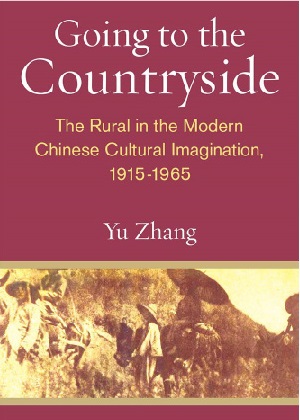- Home
- Research
- Research Output
- Books
- Going to the Countryside: The Rural in Modern Chinese Cultural Imagination, 1915-1965
Books Authored/Edited/Translated
|
Book Title |
Going to the Countryside: The Rural in Modern Chinese Cultural Imagination, 1915-1965 |
| Author |
Yu Zhang (Department of Chinese and Bilingual Studies) |
|
Publisher |
University of Michigan Press |
|
Year of Publication |
2020 |
|
ISBN |
9780472074433 |
|
|
|
|
Introduction Since the beginning of the twentieth century, modern Chinese intellectuals, reformers, revolutionaries, leftist journalists, and idealistic youth had often crossed the increasing gap between the city and the countryside, which made the act of “going to the countryside” a distinctively modern experience and a continuous practice in China. Such a spatial crossing eventually culminated in the socialist state program of “down to the villages” movements during the 1960s and 1970s. What, then, was the special significance of “going to the countryside” before that era? Going to the Countryside deals with the cultural representations and practices of this practice between 1915 and 1965, focusing on individual homecoming, rural reconstruction, revolutionary journeys to Yan’an, the revolutionary “going down to the people” as well as going to the frontiers and rural hometowns for socialist construction. As part of the larger discourses of enlightenment, revolution, and socialist industrialization, “going to the countryside” entailed new ways of looking at the world and ordinary people, brought about new experiences of space and time, initiated new means of human communication and interaction, generated new forms of cultural production, revealed a fundamental epistemic shift in modern China, and ultimately created a new aesthetic, social, and political landscape. As a critical response to the “urban turn” in the past few decades, this book brings the rural back to the central concern of Chinese cultural studies and aims to bridge the city and the countryside as two types of important geographical entities, which have often remained as disparate scholarly subjects of inquiry in the current state of China studies. Chinese modernity has been characterized by a dual process that created problems from the vast gap between the city and the countryside but simultaneously initiated constant efforts to cope with the gap personally, collectively, and institutionally. The process of “crossing” two distinct geographical spaces was often presented as continuous explorations of various ways of establishing the connectivity, interaction, and relationship of these two imagined geographical entities. Going to the Countryside argues that this new body of cultural productions did not merely turn the rural into a constantly changing representational space; most importantly, the rural has been constructed as a distinct modern experiential and aesthetic realm characterized by revolutionary changes in human conceptions and sentiments
Introduction 1 Part I. The Rural as a Reflexive Vision of Chinese Enlightenment one. How Far Are We Away from Home? Writings on Rural Hometowns and Homecomings in the Early Decades of the Twentieth Century 17 two. Creating the Rural Vernacular: Visual Imagination and Theatrical Performance in the Rural Reconstruction Movement in Ding County in the 1920s and 1930s 44 Part II. The Rural as a Constructive Vision of Chinese Revolution three. Journeys to the Revolutionary Site of Yan’an: The Construct of Red China, Time Consciousness, and Patience, 1936–45 79 four. Legitimizing Romance, Sentimentalizing the Law, and Romanticizing Labor: Valorizing Love-Law- Labor Conjunction in the Yan’an Revolutionary Culture of the 1940s 110 Part III. The Rural as an Industrial Vision of Chinese Socialism five. Creating a Rural Industrial Aesthetics: Socialist Homecoming and the Rural Modernization Project in Representational Forms in the 1950s and Early 1960s 147 xii contents six. Socialist Builders on the Rails and Road: Railway Travel, Industrialization, and Social Engineering in Chinese Socialist Films, 1949–65 182 Conclusion 208 Notes 213 Bibliography 259 Index 281
* Owners of respective book covers are credited. Book covers are for reference only. FH is unable to accept responsibility of any inaccurate information. |
|




